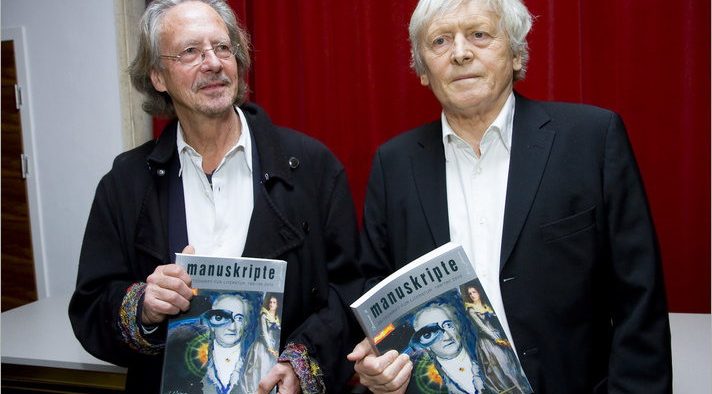New Nobel Laureate Is A Genocide Apologist

“More than ever we need public intellectuals who are able to make a robust defense of human rights in the face of the indifference and cynicism of our political leaders. Handke is not such a person.”
The Nobel Committee’s decision to name Austrian author Peter Handke as one of the two winners of the Nobel Prize in literature on Thursday ignited widespread outrage, with critics pointing to his support for the Serbs during the 1990s Yugoslav Wars and defense of their genocide against Muslims in Bosnia as a horrible position to validate in era of ascendant illiberalism, nationalism, and historical falsification.
“This is the single most offensive possible decision,” Petrit Selimi, the former foreign minister of Kosovo, wrote on Twitter. “What’s next? Assad for Peace Prize?”
Handke has written sympathetically about the Serbian role in the war for years, arguing the media unfairly placed the majority of the blame for the wars’ atrocities on the Serbs. Most notably, Handke attended the funeral of Serbian nationalist leader Slobodan Milosevic, who died while awaiting trial for war crimes and genocide at the Hague. Handke gave a eulogy at the funeral, saying he was “close to Yugoslavia, close to Serbia, close to Slobodan Milosevic.”
Historians, journalists, intellectuals, and war survivors widely contradict Handke’s narrative of the Yugoslav wars. The former state of Yugoslavia was formed after World War II and composed of Serbs, Croats, Bosnian Muslims, Albanians, and Slovenes, which split apart as genocide and ethnic cleansing returned to Europe in the 1990s. Slobodan Milosevic, known as “the butcher of the Balkans” tapped into the resentment of his people to preside over multiple wars that killed over 250,000 people.
Historian Orlando Figes described Handke as a “notorious apologist for the murderous regime of Slobodan Milosevic.” Writer David Reiff, who reported from the Bosnian war zone, reviewed Handke’s essays on the war, writing, “The truth is that he doesn’t know what he’s talking about. … He came to Serbia knowing nothing about its complicated politics and, to judge by the book, left knowing no more.”
Others complimented Handke’s artistry, but castigated his defense of the Serbian genocide.
“He is a fine writer, who combines great insight with shocking ethical blindness,” author Hari Kunzru told the Guardian. Kunzru also said that he believed Handke likely would have won the prize earlier, “had he not decided to act as a propagandist for the genocidal Milošević regime.”
Kunzru added: “More than ever we need public intellectuals who are able to make a robust defense of human rights in the face of the indifference and cynicism of our political leaders. Handke is not such a person.”
Famous Slovenian philosopher Slavoj Žižek similarly condemned the decision:
“In 2014, Handke called for the Nobel to be abolished, saying it was a ‘false canonisation’ of literature. The fact that he got it now proves that he was right. This is Sweden today: an apologist of war crimes gets a Nobel prize while the country fully participated in the character assassination of the true hero of our times, Julian Assange. Our reaction should be: not the literature Nobel prize for Handke but the Nobel peace prize for Assange.”
Some critics argue the decision shows that the prestigious intellectual prize has forfeited any remaining legitimacy. The Swedish Academy postponed its awards last year after a widely publicized sex scandal, saying it would take time to reflect on its purpose. Handke’s laureateship left critics disappointed that the Academy’s decision-making process remains deeply flawed.
Journalist Peter Maass, who reported from Bosnia during the war, was dumbfounded by the Nobel Committee’s decision to elevate “a writer who embodies the prime intellectual diseases of our era.”
“There are lots of award-winning writers who have dumb ideas about politics and politicians, and who write bad books from time to time,” wrote Maass for the Intercept. “That’s not disqualifying for a Nobel prize or a three-martini lunch with their editor. But that’s not what we’re talking about here.”
“We’re talking about denying a genocide — turning history on its head, making perpetrators into heroes and victims into villains. And this particular history, of Christians killing Muslims for the supposed sake of defending their culture, is an important one to get right at a time of heightened discrimination of Muslims and other minorities in America and Western Europe.”
“The aesthetes on the Nobel Committee have made a selection that will destroy their prize, as it should,” wrote Maass.








WOW. Yet another crack in the public conscience.